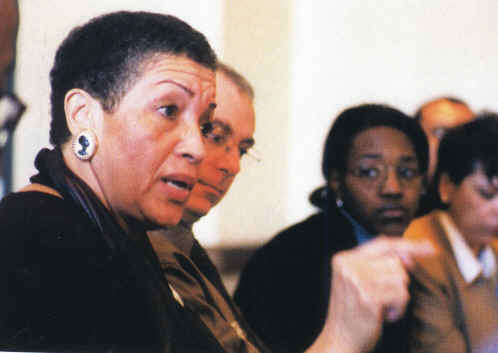- Ensuring that all students succeed
Trinity leads consortium of
Not all college freshmen become college seniors. Some of the country's most academically talented high school students enroll at selective liberal arts colleges such as Trinity but do not complete their studies. These students are disproportionately students of color. This disparity in graduation rates is a challenge faced by many institutions, and it is one that Trinity has sought to confront and remedy.
colleges aiming to eradicate disparities in graduation ratesTrinity began by looking inward, at its own retention situation, and has since become a leader for other small liberal arts colleges, in the process earning a $50,000 grant to establish a consortium of like-minded colleges. The consortium is dedicated to ensuring parity in graduation rates among all students and, more broadly, to ensuring that all students achieve at their highest potential.
"Trinity attracts diverse and academically talented students, but the overall graduation rate among minority students is not in line with the rate for majority students," says Mary Thomas, dean of students at Trinity.
In 1998, Trinity formed a Retention Task Force, a cross-campus committee of faculty, administrative staff, and students, to explore the factors that contribute to students of color graduating at lower and slower rates than white students. The task force was charged with providing recommendations on ways to eliminate the racial and ethnic disparities that exist among students and to contribute to the academic and postgraduate success of all students. The task force reported its recommendations in the fall of 1999, and as a result, a number of initiatives were introduced. Among those initiatives were several special academic support programs, including retention teams that work with students when a need for intervention is identified. A learning disabilities specialist was hired to offer diagnostic testing, recommend learning strategies, and advise students. In addition, academic skills workshops were held to improve study habits and increase awareness of available resources.
"The success of our students and their personal growth is the responsibility of all members of our community," notes Ann Reuman, assistant dean of students at Trinity. "These programs have been successful in providing academic connections for students. Students who participated felt that someone cared about them, and that's extremely important."
The Retention Task Force also addressed improvements that were needed in social, cultural, and financial areas. As a result, students, administrators, and alumni collaborated last year to plan for new and renovated cultural houses on Vernon Street.

Because retention is a challenge faced by many colleges and universities, Trinity also hosted a retention conference (photo above) in February, which drew representatives from some 30 higher learning institutions. Workshops were held on the roles faculty, admissions, and social climate play in retaining minority students. Many of the steps outlined in the task force's report, such as more proactive advising, increased academic and peer support, and improving the academic climate in residence halls, were echoed at the conference by college representatives from Colby College, Brown University, Dartmouth College, Sarah Lawrence College, Mount Holyoke College, Swarthmore College, Union College, among others.
"We actively recruit minority students whom we have identified as stars, yet when they get to the college, they are not appearing on the dean's list, they are not summa cum laude," Sylvia Langford of Dartmouth said at the conference. "I'm concerned about what we are doing for the stars, especially since we know they have the potential to be stars at the college level."
As a result of the conference, the College has received a $50,000 grant from the Nellie Mae Foundation, one of New England's largest independent charity organizations focused exclusively on education. The grant will be used to solidify a consortium of selective private colleges dedicated to meeting the challenges of ensuring parity in graduation rates across all groups of students. The Nellie Mae Foundation selected Trinity for the grant in recognition of leadership in promoting collaboration among colleges in addressing the challenges of retention. Twenty-five colleges and universities have joined the consortium, which will be headed by Sharon Herzberger, Trinity's vice president for student services. They are: Amherst College, Bard College, Barnard College, Bates College, Bowdoin College, Brandeis University, Bucknell University, Clark University, Colby College, Colgate University, College of the Holy Cross, Colorado College, Franklin & Marshall College, Hamilton College, Haverford College, Lafayette College, Middlebury College, Pomona College, Reed College, Sarah Lawrence College, Smith College, Swarthmore College, Trinity, Union College, and Vassar College.
The inaugural meeting of the consortium was held November 2 in New York, hosted by Tom Johnson '62, chairman of the Board of GreenPoint Bank and chairman of the Trinity's Board of Trustees.
President Dobelle states, "I expect the consortium to make a profound difference for the exceptional students who matriculate at our special institutions."